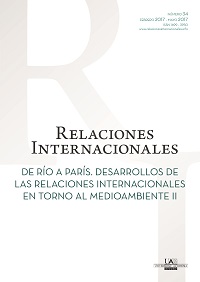Keywords:
Climate change , Securitization, Copenhagen School , Critical Security Studies , Environmental SecurityCopyright (c) 2017 Maria Francisca CASADO CLARO

This work is licensed under a Creative Commons Attribution-NonCommercial-NoDerivatives 4.0 International License.
Abstract
In the early 1980s, environmental security was not part of the international security studies mainstream, where it would be hard to imagine that it did not belong today. Even though environmental security is still developing and advancing in the political agenda, it has evolved from being initially considered a controversial field that spawned a lot of debate to being considered an aggravating factor in pre-existing conflicts or conditions and then end up having its own entity, driven by first order existential concerns, such as climate change at the time of the Anthropocene.
This article begins with a revision of the concept of environmental security, it then addresses the analytical framework of the Copenhagen School and its application to the environmental security sector, with the aim of analyzing the successful securitization of climate change by the international community.
Downloads
References
ALLENBY, Braden R., “Environmental security: Concept and implementation”, en International Political Science Review, nº 21, 2000, ps. 5–21.
BALZACQ, Thiérry, “The three faces of securitization: Political agency, audience and context” en European Journal of International Relations, nº 11 (2), ps.171–201.
BARNETT, Jon, “Environmental Security”, en COLLINS, Alan (ed.) Contemporary Security Studies, Oxford University Press, Oxford, 2007, ps. 182–203.
BARNETT, Jon, The Meaning of Environmental Security: Ecological Politics and Policy in the New Security Era, Zed Books, Londres, 2001.
BOOTH, Ken, "Security and emancipation", en Review of International Studies, nº 17 (04), 1991, ps. 313-326.
BOOTH, Ken (ed.), Critical Security Studies and World Politics, Lynne Rienner Publishers, Boulder, Colorado, 2005.
BRAUCH, Hans Günter, “Four phases of research on environment and security”, en Encyclopedia of Life Support System, International Security, Peace, Development and Environment, 2007.
BRAUCH, Hans Günter, et.al. (eds.), Facing global environmental change: Environmental, human, energy, food, health and water security concepts, Hexagon Series on Human and Environmental Security and Peace, Springer, 2009.
BROWN, Lester Russell, Redefining national security, vol. 14, Worldwatch Institute, Washington D.C., 1977.
BUENO RUBIAL, María del Pilar, “El Acuerdo de París: ¿una nueva idea sobre la arquitectura climática internacional?”, Relaciones Internacionales, nº 33, 2016, ps.75-95.
BUZAN, Barry, WÆVER, Ole y DE WILDE, Jaap, Security: a new framework for analysis, Lynne Rienner Publishers, Londres, 1998.
BUZAN, Barry y HANSEN, Lene, The evolution of International Security Studies, Cambridge University Press, 2009.
DEUDNEY, Daniel H., “Environmental security: A critique” en DEUDNEY, Daniel H. y MATTHEW, Richard A. (eds.), Contested Grounds: Security and Conflict in the New Environmental Politics, SUNY Press, Albany, Nueva York, 1999, ps. 187–219.
DEUDNEY, Daniel, “Environment and Security: Muddled Thinking”, en Bulletin of the Atomic Scientists, nº 47, 1991, ps. 22–28.
FLOYD, Rita, Consequentialist evaluation of security for cooperative international society: a framework for analysis, ISA’s 49th Annual Convention, Bridging Multiple Divides, San Francisco, 2008. http://research.allacademic.com/one/isa/isa08/index.php?click_key=1#search_top [consultado el 19 de enero de 2015].
HOMER-DIXON, Thomas F., “On the Threshold: Environmental Changes as Causes of Acute Conflict”, en International Security, 16 (2), 1991, ps. 76-116, doi: 10.2307/2539061.
HOMER-DIXON, Thomas F., “Thresholds of Turmoil: Environmental Scarcities and Violent Conflict”, DEUDNEY, Daniel H., y MATTHEW, Richard A. (eds.), Contested grounds: security and conflict in the new environmental politics, SUNY Press, Albany, Nueva York, 1999, ps. 61–90.
HOUGH, Peter, Environmental Security: An introduction, Routledge, Londres, 2014.
KRAUSE, Keith, y WILLIAMS, Michael C., “Broadening the agenda of security studies: politics and methods”, en Mershon International Studies Review, nº 40, 1996, ps. 229–54, doi: 10.2307/222776.
LIDSKOG, Rolf; SUNDQVIST, Göran, “The role of science in environmental regimes: The case of LRTAP” en European Journal of International Relations, vol. 8, nº 1, 2002, ps. 77-101.
MUTIMER, David, “Critical Security Studies: A schismatic history”, en COLLINS, Alan (ed.) Contemporary Security Studies, Oxford University Press, Oxford, 2007, ps. 53–74.
RØNNFELDT, Carsten F., “Three generations of environment and security research”, en Journal of Peace Research, nº 34, 1997, ps. 473–82.
STRITZEL, Holger, Security in translation: Securitization theory and the localization of threat, Palgrave Macmillan, 2014.
TROMBETTA, Maria Julia, “Rethinking the securitization of the environment: Old beliefs, new insights”, en BALZACQ, Thierry (ed.), Securitization Theory: How security problems emerge and dissolve, Routledge, Londres, 2011, ps. 135–49.
ULLMAN, Richard H., “Redefining security”, en International Security, nº 8, 1983, ps. 129–53, doi: 10.2307/2538489.
UNITED NATIONS DEVELOPMENT PROGRAMME, Human Development Report 1994, Oxford University Press for the United Nations Development Programme (UNDP), Nueva York, 1994.
VERDES-MONTENEGRO ESCÁNEZ, Francisco J., “Securitización: agendas de investigación abiertas para el estudio de la seguridad”, Relaciones Internacionales, nº 29, 2015, ps. 111-131.
WÆVER, Ole, Concepts of security (PhD thesis), University of Copenhagen, Institute of Political Science, 1997.





